Performance Of Mixed Ordinary And High Strength Steel Reinforced Concrete Frames
Price
Free (open access)
Transaction
Volume
97
Pages
11
Page Range
347 - 357
Published
2008
Size
1,724 kb
Paper DOI
10.2495/HPSM080361
Copyright
WIT Press
Author(s)
A. U. Qazi, L. Ye & X. Lu
Abstract
Earthquakes are still claiming lives despite the advancements in earthquake resistance techniques and structural design methodologies. Formations of collapse mechanisms under strong ground motions are not uncommon in RC frames. Failure mechanisms in ordinary RC frames are believed to be prevented by adopting the strong column weak beam philosophy. However, limited flexural strength and lateral deformation capacity of the ordinary steel reinforced columns often results in the incipient of the failure mechanisms. Large inelasticity at the column bases poses serious problems and global stability of the structure is endangered. Furthermore large residual displacements at the end of a dynamic event cannot be ruled out. A numerical study on the performance of frames reinforced with the mixed high strength and ordinary reinforcements in the columns revealed steadier performance as compared to ordinary RC frames. The moderate rise frame, a mixed ordinary and high strength steel reinforced concrete frame (MRC), showed more lateral strength as compared with the ordinary RC frame. Failure mechanisms in the moderate rise MRC frame are almost prevented or delayed as compared with the ordinary RC frame. In the relatively high rise MRC frame, a less obvious increase in lateral strength in comparison with the ordinary RC frame is observed. However, greater deformation capacity and a delay in the formation of the collapse mechanism are observed in the high rise MRC frame. Residual displacements are also minimized in the MRC frame as compared to the ordinary RC frame. It is envisaged that steady performance of the MRC frame can give a more stable response during earthquakes. Keywords: earthquake, failure mechanisms, residual displacements, mixed reinforcements, steady response.
Keywords
earthquake, failure mechanisms, residual displacements, mixed reinforcements, steady response.





